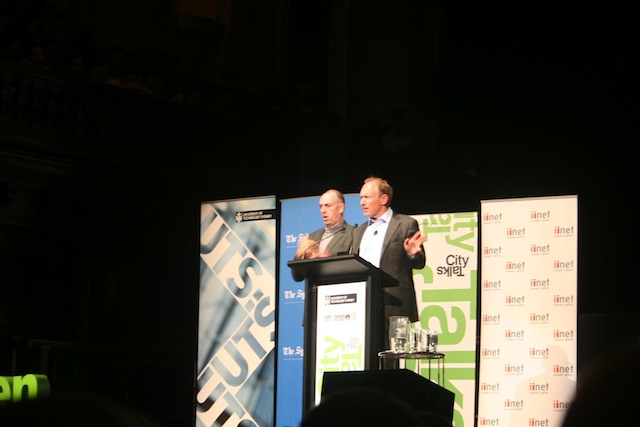On Tuesday Tim Berners-Lee rounded off his Australian speaking tour with a City Talks presentation before 2,000 people at a packed Sydney Town Hall.
After an interminable procession of sponsor speeches, Berners-Lee covered many of the same topics in his presentations at the Sydney CSIRO workshop the previous week and the Melbourne talk the night before.
These included a call for everyone to learn some computer coding skills – or at least get to know someone who has some, wider technology education opportunities, more women in computing fields and a warning about the perils of government over-surveillance.
On government monitoring Internet traffic, Berners-Lee has been strident at all his talks and correctly points out most of our web browsing histories allow any outrageous conclusion to be drawn, particularly by suspicious law enforcement agencies and the prurient tabloid media.
Who owns the ‘off switch’ is also a concern after the Mubarak regime cut Egypt off the Internet during the Arab Spring uprising. The willingness of governments to cut connectivity in times of crisis is something we need to be vigilant against.
The web’s effect on the media was discussed in depth as well with Sean Aylmer, editor-in-chief of the Sydney Morning Herald, saying in his introduction that Berners-Lee’s invention had been the defining feature of Aylmer’s career.
While the web has been traumatic for a generation of newspapermen, Berners-Lee sees good news for journalists in the data explosion, “how do we separate the junk from the good stuff?” Asks Tim, “this is the role for journalists and editors”.
One person’s junk is another’s treasure though and the web presents one of the greatest opportunities for people to “write on their blank sheet of paper.”
When asked about what he regretted most about the web, Berners-Lee said “I’d drop the two slashes,” repeating the line from Melbourne the night before.
At each of his Australian speeches Berners-Lee has paid homage to his mentor at CERN, Mike Sendall. After Sendall passed away, his family found the original proposal for the Hyper Text Markup Language (HTML) which formed the basis for the world wide web.
“Exciting but vague” was the note Sendall made in the margins of Berners-Lee’s proposal.
Vague and exciting experiments was what drove people like James Watt and Thomas Edison during earlier periods of the industrial revolution. Tomorrow’s industries are today’s vague and strange ideas.

Leave a Reply